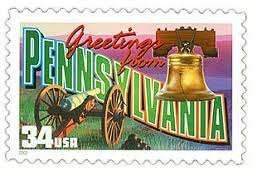Pennsylvania Gaming Study: Online Poker Should Help B&M Casinos
In December 2013, the Pennsylvania Legislative Budget and Finance Committee authorized Econsult Solutions, Inc. analyze both the current state of Pennsylvania’s casino gaming industry and its future. Econsult just recently published the nearly 200-page report, one of the highlights of which was the outlook for a hypothetical online gaming industry in the Commonwealth.
The internet poker discussion begins in Section 5: New Sources of Revenue. After an explanation and analysis of the international market, past and present U.S. markets, and the regulated New Jersey market (particularly applicable because it is a neighbor of Pennsylvania and both are states large enough to sustain an internet poker economy by themselves), the focus shifts to Pennsylvania specifically.
First, Econsult attempts to estimate the size of the size, in dollars, of the U.S. market, should online gambling become legalized and regulated nationwide. Two methods are used, from which an average is taken: econometric and rule-of-thumb. We’ll let them explain the econometric approach:
…uses international data on gambling and demographics to predict the level of online casino, poker,
bingo, and betting revenues for the U.S. market overall. Regression analysis was used to establish an empirical relationship between the 2012 iGaming revenues in countries where it is largely legal or effectively unregulated, and a set of independent variables describing that country’s economy, and their past online gaming levels prior to most regulations.
In the simpler, “rule-of-thumb” approach, Econsult looked at a set of countries with developed online gaming industries that it determined were most comparable to the U.S. and calculated the average igaming revenue per adult.
The results: an estimate (after averaging the figures from the two approaches) of $3.577 billion in revenue per year for online poker and $4.922 billion for casino games like craps and roulette, for a total of $8.498 billion.
Next, Econsult drilled down to Pennsylvania. Again, it used two approaches. The first just calculated the proportion of Pennsylvania’s GDP to the entire country, 3.86 percent. The second used a database provided by the University of Hamburg to determine how much of the 2010 U.S. poker market was attributable to Pennsylvania (3.36 percent). Averaged, you get 3.61 percent.
So, using that percentage, the consulting firm estimates ongoing annual internet gaming revenues in Pennsylvania to  be $307 million, $129 million from poker and $178 million from casino games. And because New Jersey has fallen short of expectations so far, the theoretical first year of online gambling in Pennsylvania is estimated to be just 60 percent of the ongoing revenues, so $184 million ($77 million from poker, $107 from casino games).
be $307 million, $129 million from poker and $178 million from casino games. And because New Jersey has fallen short of expectations so far, the theoretical first year of online gambling in Pennsylvania is estimated to be just 60 percent of the ongoing revenues, so $184 million ($77 million from poker, $107 from casino games).
Then there is the interesting issue of cannibalization, the idea that online gambling could take away revenue from land-based casinos in the Commonwealth. Econsult presents an idea that most of us in the online poker community have always argued, saying, “…iGaming may not only be benign in terms of land-based gaming but actually be synergistic and generate an increase in casino foot traffic and land-based revenues as new gamers become comfortable with playing poker.”
The report posits that the lack of cannibalization would be because the online and brick-and-mortar gambling markets do not overlap much. Players often like internet gambling because it is extraordinarily affordable; games can be played for mere pennies. Online gamblers are also more likely to have higher education, higher income, be employed, and be male than live gamblers. And, of course, online gaming provides the opportunity to play multiple tables at once and track all sorts of stats with software. Land-based gamblers tend to prefer the social aspect of gambling and the amenities casinos offer.
Enconsult also adds the following:
In addition to a small cannibalization effect, there is reason to believe that there may be some complementary effect that could generate more revenue for offline casinos. The fact that iGaming caters to a market of new gamers presents casinos with an opportunity to attract new customers. In particular, the younger and higher income demographics of online gamers makes them an attractive demographic for land-based casinos whose crowds tend to be older.
As a gigantic sample size of one, I can personally attest to how online poker can actually bring land-based casinos business. When I discovered online poker in, say, 2003 or so, I didn’t know anything about gambling, aside from the basics of blackjack. I had only been to a casino once – an Indian casino after I turned 18 – and only played nickel slots and $5 blackjack. I started with play money online poker, received a free $10 from an online poker room, ran that up to $100, found an affiliate, and my poker hobby took off from there. Because online poker not only got me comfortable with the game, but also got me to enjoy it as a regular pastime, my wife and I thought it would be fun to make our first trip to Las Vegas. Without online poker, I would never have considered Vegas as a vacation destination. As a result, casinos there not only got our gambling dollars, but our dining, hotel, and entertainment dollars, as well.
Enconsult doesn’t present one specific number to determine the impact of cannibalization, but says it is much more likely that online gambling will have a complement effect and help casinos than it would a replacement effect, which would hurt them. On the low end, if cannibalization does happen, land-based casinos could lose $15 million per year to online sites, but on the other side, the benefit to land-based casinos could be as high as $92 million.
Finally, it boils down to how much money the Commonwealth of Pennsylvania will see in tax revenue from online gambling sites. After taking a gander at a potential tax rate, Enconsult actually sees greater revenues flowing into state coffers from poker, $77 million per year ongoing, than from casino games, $36 million. Add that up and we get $113 million per year in tax revenue. As with the gambling site revenue figures from earlier, this number was discounted for the first year down to $68 million, split into $46 million for poker and $21 for casino gaming.
Complete Pennsylvania Casino Gaming Report
Single Page Highlights



















COMMENTS